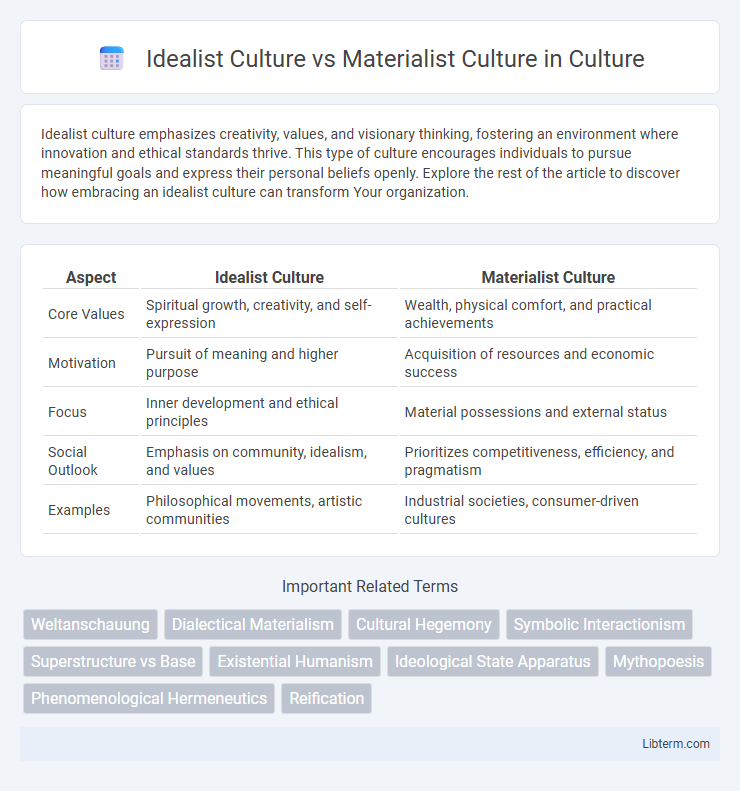Idealist culture emphasizes creativity, values, and visionary thinking, fostering an environment where innovation and ethical standards thrive. This type of culture encourages individuals to pursue meaningful goals and express their personal beliefs openly. Explore the rest of the article to discover how embracing an idealist culture can transform Your organization.
Table of Comparison
| Aspect | Idealist Culture | Materialist Culture |
|---|---|---|
| Core Values | Spiritual growth, creativity, and self-expression | Wealth, physical comfort, and practical achievements |
| Motivation | Pursuit of meaning and higher purpose | Acquisition of resources and economic success |
| Focus | Inner development and ethical principles | Material possessions and external status |
| Social Outlook | Emphasis on community, idealism, and values | Prioritizes competitiveness, efficiency, and pragmatism |
| Examples | Philosophical movements, artistic communities | Industrial societies, consumer-driven cultures |
Defining Idealist and Materialist Cultures
Idealist culture emphasizes values, beliefs, and ideas as the primary drivers of human behavior, prioritizing spiritual, intellectual, and moral goals over physical possessions. Materialist culture focuses on tangible assets, economic success, and physical comfort, viewing material wealth and technological advancement as key indicators of progress. Defining idealist and materialist cultures involves analyzing how societies prioritize abstract principles versus concrete resources in shaping their social structures and individual motivations.
Historical Roots of Idealism and Materialism
Historical roots of idealism trace back to ancient Greek philosophers like Plato, who posited that reality is shaped by immaterial ideas and forms, emphasizing mind over matter. Materialism finds its origins in early thinkers such as Democritus and Epicurus, who argued that physical matter and sensory experience constitute the basis of existence. These foundational philosophies shaped cultural worldviews, influencing societies that prioritize spiritual and intellectual values versus those emphasizing tangible wealth and physical conditions.
Core Values of Idealist Cultures
Idealist cultures prioritize core values such as truth, beauty, and morality, emphasizing the pursuit of intellectual and spiritual growth over physical or material wealth. These societies often view reality through a mental or ethical lens, promoting ideals like virtue, wisdom, and harmony as fundamental principles guiding behavior. Idealist cultures value principles and ideals as the foundation for social order and personal identity, often encouraging self-reflection and moral integrity.
Core Values of Materialist Cultures
Materialist cultures prioritize economic success, technological advancement, and practical achievements as core values that drive societal progress. These cultures emphasize wealth accumulation, efficiency, and tangible outcomes, often valuing science, innovation, and infrastructure development over spiritual or ideological pursuits. The materialist worldview supports a focus on consumption, productivity, and measurable growth as fundamental elements shaping social norms and individual behavior.
Social Structures and Relationships
Idealist cultures prioritize values, beliefs, and spiritual principles that shape social structures around collective identity and moral obligations, fostering relationships based on shared meaning and ethical commitments. Materialist cultures emphasize tangible resources, economic status, and physical well-being, structuring society around productivity, wealth distribution, and hierarchical power dynamics. Social relationships in idealist contexts tend to be community-oriented and interdependent, whereas in materialist cultures they often reflect competition, individual achievement, and resource control.
Education and Knowledge in Both Cultures
Idealist culture values education as a means to cultivate wisdom, emphasizing philosophy, ethics, and the pursuit of truth through critical thinking and introspection. Materialist culture prioritizes practical knowledge and technical skills, focusing on education that enhances economic productivity, scientific innovation, and tangible outcomes. Both cultures shape knowledge acquisition differently, with idealism fostering abstract understanding and materialism driving empirical evidence and technological advancement.
Economic Implications and Lifestyles
Idealist cultures prioritize values such as spirituality, creativity, and community, leading to economic models that emphasize sustainability, ethical consumption, and social welfare systems. Materialist cultures focus on physical wealth, technological advancement, and consumerism, driving economies centered on production, market expansion, and individual financial success. These divergent priorities shape lifestyles, with idealist cultures adopting minimalist living and cooperative behaviors, while materialist cultures favor high consumption, competitive environments, and innovation-driven growth.
Art, Religion, and Cultural Expression
Idealist culture prioritizes spiritual values, emphasizing art as a medium for transcendental expression and religion as a guiding principle for moral and existential meaning. Materialist culture centers on tangible, physical realities, with art often reflecting social and economic conditions, and religion serving more practical or social functions. Cultural expression in idealist societies tends to explore metaphysical themes, while materialist cultures showcase technological progress and material wealth.
Contemporary Examples Around the World
Idealist culture, emphasizing values such as spirituality, art, and personal fulfillment, is evident in countries like Japan, where traditional practices coexist with modern innovation, and in Scandinavian nations prioritizing social welfare and environmental sustainability. Materialist culture, focusing on economic growth, technological advancement, and consumerism, dominates in the United States and China, where industrial output and market expansion drive national priorities. Contemporary global trends reveal a complex interplay between these cultural orientations, influencing policies, business strategies, and social behaviors worldwide.
Bridging the Gap: Toward Cultural Balance
Bridging the gap between idealist culture, which prioritizes values, beliefs, and human experience, and materialist culture, centered on physical reality and scientific advancement, requires fostering dialogue that respects both perspectives. Integrating ethical considerations into technological progress promotes cultural balance, ensuring that innovation aligns with societal well-being and human dignity. Collaborative frameworks between philosophers, scientists, and community leaders enhance mutual understanding and create sustainable pathways merging spiritual richness with material prosperity.
Idealist Culture Infographic

 libterm.com
libterm.com